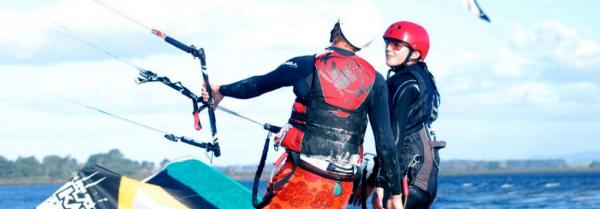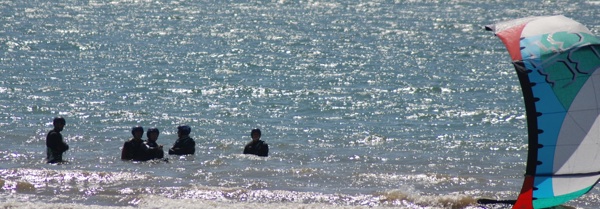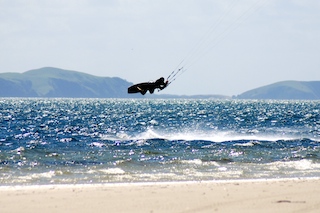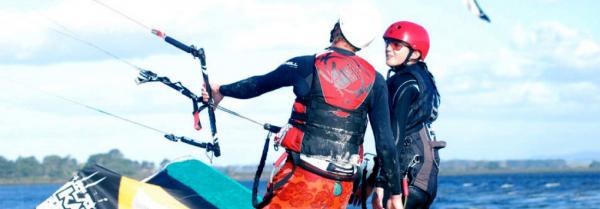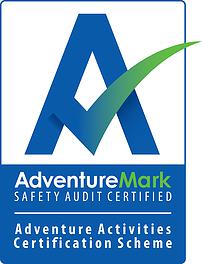Become an IKO Instructor
Qualify as an international kitesurf instructor on one of Airzone Kitesurf School's IKO kitesurf instructor courses in New Zealand and travel the world doing something you love. Become an IKO kitesurf instructor and earn additional income, fund your travels or gap year, or completely change your lifestyle. Recognised worldwide, the Airzone Kitesurf School is the only place in NZ offering IKO instructor courses.
IKO Kitesurf Instructor Training Courses
The IKO Instructor qualification is truly international, respected across the world. With jobs for Level 1 instructors at amazing locations throughout Australia, New Zealand, The Cook Islands, Asia, Africa, South America, Europe, the US, Bahamas, Caribbean and more, it really does open up some great opportunities.
There are two 5 day courses to become an IKO instructor. The Assistant Trainer Course (ATC) and Instructor Training Course (ITC).
The ATC gives you all the background theoretical knowledge including, weather, wind and tide information, kite aerodynamics, etc, as well as practical elements such as fixing and maintaining equipment, beach management and taking part in teaching demonstrations. The Assistant Trainer qualification is a prerequisite for the Instructor Training Course, and it gives you the foundation of knowledge that you need to become an IKO Instructor. You will also have access to online learning before coming on the course.
The ITC will teach you how to teach kitesurfing, from the psychology and methodology of teaching, to learning the IKO lesson plan. There is plenty of teaching practice, observation and feedback before you teach your own beginner students at the end of the course.
The IKO Instructor courses are for experienced kite surfers (see the list prerequisites below). But even if you have never flown a kite before, you can come on a fast track kitesurf instructor course with us in New Zealand and learn to kitesurf and qualify as an IKO instructor. We will take you from absolute beginner to IKO instructor in twelve weeks.
We usually plan both courses over two consecutive weeks, with a weekend between for a rest, a bit of riding, or to catch up on any elements we might not have the conditions for during the courses. So you can do both courses back to back to gain the full qualification, or you can do the ATC and ITC at separate times in the year.
If you are an experienced kitesurfer, and can jump and grab and jump transition, then you can come on the ATCs and ITCs listed below. If you need a bit of practice before you are at that level, we can tailor some coaching for you in the lead up to the course.
IKO Assistant Training Course (ATC) dates
29th April to 3rd May 2024 TBC $725*
Nov/Dec 2024 dates TBC$725*
* plus US$169 registration fee paid direct to the IKO, which gives immediate access to online learning. Our prices above in NZ$.
Instructor Training Course (ITC) dates
6th to 10th May 2024 TBC $1195*
Nov/Dec 2024 dates TBC $1195*
* plus US$299 registration fee paid direct to the IKO, which includes one year's IKO instructor membership and recreational and professional insurance cover. Our prices above in NZ$.
Dates will depend on the number of students - we need a minimum of 4. Register your interest in becoming an IKO instructor to make it happen!
Special price for ATC + ITC back to back NZ$1850 plus US$468 IKO fees |
The international kitesurf instructor qualification
You are aiming to become a Level 1 IKO instructor by the end of your ITC. This qualification enables you to teach straightaway around the globe. So you can apply for jobs at kiteboarding schools worldwide, or start teaching by yourself. As a Level 1 kitesurf instructor you can teach two students with one kite. The next milestone is to progress to a Level 2 instructor. You can achieve this by teaching a certain number of hours as a Level 1 instructor, and passing an online exam. As a Level 2 instructor you can to set up an IKO kiteboarding school or become a head instructor within an existing school. You will also be more attractive to employers at kitesurf schools who often want Level 2 instructors to guarantee a level of experience. |
ITC prerequisites
You need to have certain levels of experience and some other qualifications before you can come on an (IKO) Kitesurf Instructor Training Course (ITC). The IKO currently requires that you must:
- Be at least 18 years old.
- Be a certified IKO kiteboarder Level 4 with the ability of jumping with grab, jump transition, toe side riding upwind, board recovery in deep water, rider recovery body dragging, able to make a self-rescue in deep water, self-launching and self-landing (evaluated during ITC).
- Have a valid first aid and CPR certificate (less than two years' old).*
- Complete the ATC.
- Be able to read, write and speak fluently in the language the course is given.
- Sign the IKO waiver form.
- *It may be possible to complete a first aid course after the ITC, but it will not be possible to validate you as an instructor until we receive a copy of the certificate.
Course schedules
The AITC is five days and covers all the information you need as to have the knowledge to undertake the instructor course, including in depth theory on elements such as weather, wind, tide and location assessment, equipment history and types, kite flight theory, etc. You will also shadow an instructor teaching the full IKO beginner syllabus, so you know how it all works. Then the ITC teaches you how to teach it. The ITC is also five days, each day starting at 9.30am and finishing around 5pm. Timings are a little flexible depending on weather, numbers on the course and progress. You will have additional homework and preparation most days. The first two days will be spent mostly in the classroom, though we do try and get outside everyday so cabin fever doesn’t kick in. You will undertake a riding assessment and boat session during the course, with timings dependant on wind and conditions. We then have live teaching practice on day four and five with real beginner students. Practical assessment is ongoing throughout the course. You will need to make a presentation to the group, be assessed teaching real students on the last two days, and there will be an examination on the last day. Individual feedback happens on the last day in the afternoon. |
Our approach is very much about support, helping you to become a good instructor, not just testing you on what you already know. |
 Newly qualified IKO instructors team photo |
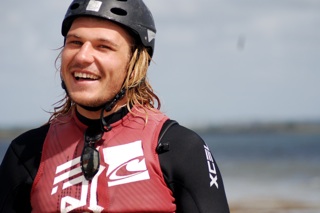
Instructor just graduated Instructor just graduated |
What to bring
- Your own gear to go riding with – kite and board, etc
- Full warm wetsuit – it gets chilly standing around in the water teaching
- Helmet and buoyancy aid if you have them (you will need them when you are an instructor, but can borrow some of ours if you do not have them)
- Writing materials
- A valid first aid certificate (less than two years' old)
- An Assistant Instructor qualification unless taking the ATC with us
If you do not have all the kit yourself, or cannot bring it due to travel restrictions, you can borrow/hire our equipment for the elements of the course where it is required. Please let us know before the course.
Course locationThe course will be at our base in Rangiputa on the Karikari Peninsula in the far north of New Zealand. It's an amazing location with loads of wind, flat water and wave beaches, so you might get a chance to get out and let off some steam while you are here! We offer accommodation for kitesurf instructors at Kite Camp from $60 per person. |
Passing the course
On completion of the IKO ITC, and any supporting courses needed, you should have covered all elements required to become a qualified Level 1 IKO instructor. We hope that you qualify at the end of the course, but if you don’t we will map out a way forward for you to achieve L1 qualification. If there has not been enough wind to compete your live teaching, or you are weak in any area you may be required to complete some additional training, or a personal action plan before you are signed off as an IKO instructor. It is extremely rare for anyone to fail without a way forward to qualify.
We can't guarantee that you pass the IKO course - that depends on you. Though we work with you to help you in every way we can. Our aim is to produce good instructors, and for you to get the most out of your instructor course. All previous students have either passed the course, or have completed some extra tasks required following the course to become instructors. All are now fully signed off and teaching around the world.
Some previous students - how becoming a kitesurf instructor changed their lives:
Ben Mugford – Career changeBen was a senior buyer for a defence and technology company. He’d had enough of sitting at a desk in a job he didn’t enjoy. Remembering how much he enjoyed windsurfing and travelling during a gap year, Ben realised he had a choice and could make a change in his life to get away from that desk. Ben said “Many people don’t like their jobs, but don’t think they can do anything about it. I felt I was cheating myself by not doing anything, so I booked onto Airzone's IKO kitesurf instructor course. I had a great time, and now have a new passion in my life!” Ben and his girlfriend, Janet, who also attended the course have given up their jobs, and are now managing a kitesurfing school in Melbourne, Australia. They plan to set up their own school in Fiji or the Caribbean in the future. “I’ll never regret making the changes to my life”, says Ben. |
Ellie Stimpson – Gap yearEllie had just finished college, and wanted to fund her gap year before going to university. Having completed a three day course with us the year before, Ellie decided she loved kitesurfing, and becoming an instructor could be the perfect way to help finance her trip and future travels. After some frustration trying to practice in the UK with the wrong conditions Ellie joined our instructor course in February and March in New Zealand. “It was great being able to kitesurf every day”. After completing the course Ellie travelled around New Zealand, then over to a kitesurfing job in Australia. After a quick stop back home it was off to Asia for some more travelling and kitesurfing before returning to the UK and university in York. “Now all my holidays while at uni can be funded by kitesurfing instruction, and if not, I can just have fun kitesurfing!” |

